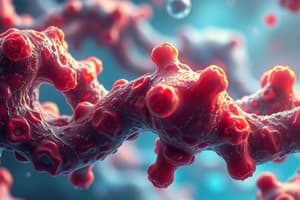Podcast
Questions and Answers
What are the course learning outcomes (CLO) for IMK 227 Biochemistry?
What are the course learning outcomes (CLO) for IMK 227 Biochemistry?
The course learning outcomes (CLO) for IMK 227 Biochemistry are CLO1: Describing the structure, functions and mechanisms of the components of the cells and the biochemical process, CLO2: Explaining biochemical applications in the industry, and CLO3: Presenting biochemical process orally with confidence.
What does the course cover in terms of cell bioenergetics?
What does the course cover in terms of cell bioenergetics?
The course covers enzymes kinetics, inhibition and regulation, and various metabolic pathways in terms of cell bioenergetics.
What are the method of assessments for the course IMK 227 Biochemistry?
What are the method of assessments for the course IMK 227 Biochemistry?
The method of assessments for the course IMK 227 Biochemistry include 60% coursework, 40% Final Examination, Test 1: 15% (Dr. H), Test 2: 15% (Dr. H), and Presentation: 30% (Dr. L).
What are the references for the textbook used in the course?
What are the references for the textbook used in the course?
Who is the instructor for the course presentation and the associated weightage?
Who is the instructor for the course presentation and the associated weightage?
What are the components of the cells and the biochemical processes described in CLO1?
What are the components of the cells and the biochemical processes described in CLO1?
What are the biochemical applications in the industry as mentioned in CLO2?
What are the biochemical applications in the industry as mentioned in CLO2?
What is the breakdown of the method of assessment for the course?
What is the breakdown of the method of assessment for the course?
Who are the authors of the optional textbook reference?
Who are the authors of the optional textbook reference?
What are the two tests and their respective weightages in the method of assessment?
What are the two tests and their respective weightages in the method of assessment?
Who proposed the Cell Theory and in what year?
Who proposed the Cell Theory and in what year?
What are the three main points of the Cell Theory?
What are the three main points of the Cell Theory?
What are the common functions that all organisms, whether multicellular or unicellular, must accomplish?
What are the common functions that all organisms, whether multicellular or unicellular, must accomplish?
How do most cells with a diameter between 1-100 µm get visualized?
How do most cells with a diameter between 1-100 µm get visualized?
What are the two main cell types mentioned in the text?
What are the two main cell types mentioned in the text?
Flashcards are hidden until you start studying




